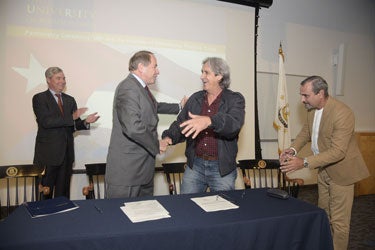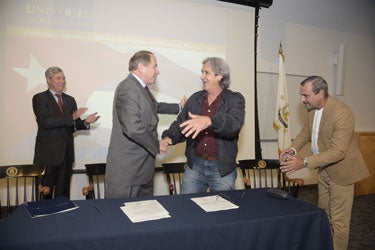KINGSTON, R.I. – Sept. 28, 2015 – With Cuban and American flags in the background, the University of Rhode Island and a Cuban academic institute signed a historic agreement today, paving the way for URI students to study on the island nation this spring.
 During the first-ever, one-semester program at the Institute of Philosophy in Havana students will study Cuban history and politics and immerse themselves in the local culture through internships, lectures and field trips.
During the first-ever, one-semester program at the Institute of Philosophy in Havana students will study Cuban history and politics and immerse themselves in the local culture through internships, lectures and field trips.
The partnership, formalized during a spirited ceremony in a political science class at Swan Hall, reflects the University’s resolve to expand study abroad programs – and transform itself into a global institution where the world is a classroom.
Among those present for the signing of the “memorandum of understanding” were URI President David M. Dooley, two Cuban scholars – Gilberto Valdes Gutierrez and Humberto Miranda Lorenzo – and U.S. Sen. Sheldon Whitehouse, who played a key role in the study abroad initiative.
“We live in a global society, making it more important than ever to provide students with enriching and challenging academic opportunities abroad that help them become leaders – and globally prepared citizens,” said Dooley. “Our partnership with the Institute of Philosophy in Havana enhances our growing reputation as a world-class University focused on developing 21st century international initiatives.”
Whitehouse also praised the program, calling it a “coup” for URI: “I’m delighted to see this agreement expand opportunities for University of Rhode Island students to explore Cuba’s rich culture and share Rhode Island’s rich culture with the Cuban people. It also represents a valuable and unique addition to the University’s curriculum. Congratulations to both URI and the Institute.”
The signing comes at a propitious time. All eyes are on Cuba with Pope Francis’ recent visit to the island and the warming of relations between Cuba and the United States after more than a half-century-long diplomatic freeze.
Students, faculty and administrators filled Swan’s auditorium to witness the signing and, later, ask questions about the political and economic future of Cuba, which is slowly transitioning into a market-driven economy.
One student asked how tourism would impact the island? Lorenzo said he can’t imagine an influx of 3 to 4 million tourists a year on an island about the size of Tennessee: “Where do we locate them?” Another student asked whether opening relations would harm Cuba, rather than help it. Lorenzo said he thought normalization would be good for his country – and the United States.
Lorenzo was effusive in his praise of URI’s new Cuba program, calling it the start of a “long and strong” bridge with the University. He encouraged students to sign up for the life-changing experience. “Many thanks to all,” he said.
The program was developed by two professors who have studied the history and politics of the country for years: Richard McIntyre, an economics professor and chair of the Economics Department, and Maureen Moakley, who teaches political science and is a longtime political commentator in Rhode Island.
From Feb. 1 through April 26, the URI students will study introduction to Cuban society, economic development and social movements in Latin America, Cuban literature and the arts, and the Cuban revolution. Lorenzo and two other Cuban scholars will teach the classes, and Moakley and McIntyre will help design and oversee the program, managed by Gutierrez, associate director of the Institute.
Students will also participate in internships involving the arts, writing, literature or music. And they’ll attend lectures by artists, diplomats, musicians, writers and journalists, as well as visit museums and historic sites. They’ll live in an apartment complex in a Havana suburb.
URI’s partnership with Cuba has been long in the making. For several years, Moakley and McIntyre have been taking students to Cuba for 10 days in January as part of URI’s J term program – a trip that will be offered again this year.
When President Barack Obama restored diplomatic relations with Cuba nine months ago, the professors jumped on the opportunity and started exploring a longer, semester-abroad program on the communist-run nation 90 miles off the southern tip of Florida.
Through their ties to Cuba, and with the assistance of Whitehouse, they were able to create a program in a timely way. It helped that Lorenzo, a political economist, was a Distinguished Visiting International Scholar at URI for two weeks in October 2014.
Other collaborations with Cuba are also the works. The URI Graduate School of Oceanography is planning a series of marine science partnerships with the University of Havana, the National Aquarium of Cuba and the Cuban Institute of Oceanology. URI Oceanography Dean Bruce Corliss envisions faculty and student exchanges, research collaborations and expeditions in Cuban waters aboard the URI research vessel Endeavor.
URI hopes to bring Cuban musicians, artists and scholars to Kingston in the next few years as it continues to cultivate academic and artistic exchanges that could also lead to URI professors doing research in Cuba.
It’s important for today’s college students to get a global education, Moakley and McIntyre said. The world is connected through technology, the economy is global and the workforce is global. And study abroad programs, like the one in Cuba, expose students to a different way of life than the one they’re used to in America. That experience can broaden thinking and lead to new ideas.
“It’s crucial for students today to be exposed to different cultures throughout the world,” said Moakley. “The study abroad program in Cuba will make our students more compassionate learners, prepare them for a global workforce and help them appreciate the responsibilities of global citizenship.”
McIntyre said he looks forward to a lasting relationship with Cuba. “URI’s agreement with the Institute will be the basis for deepening ties of friendship and scholarship between Kingston and Havana and provide our students with the opportunity to be at the cutting edge of one of the most exciting political and economic developments of our time.”
They both agreed that the benefits to all are enormous. “It is our hope now,” said Moakley, “that we can begin to learn from one another.”
Others attending the event were Provost and Vice President for Academic Affairs Donald H. DeHayes; Nancy Stricklin, assistant to the Provost for Global Strategies and Academic Partnerships; and Winifred Brownell, dean of the College of Arts and Sciences.
To register for the program, contact Moakley at (401) 874-4055 or moakley@uri.edu; or McIntyre at (401) 874-4126 or mcintyre@uri.edu. Applications are available at the Office of International Education, 37 Lower College Road on URI’s main campus in Kingston.
Photo above: from left to right, U.S. Sen. Sheldon Whitehouse, URI President David M. Dooley, Gilberto Valdes Gutierrez and Humberto Miranda Lorenzo formalize a partnership for a study abroad program in Cuba this spring. Photo by Michael Salerno Photography.

